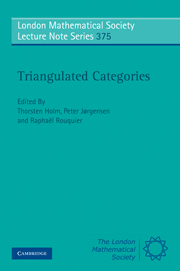Book contents
- Frontmatter
- Contents
- Preface
- Triangulated categories: definitions, properties, and examples
- Cohomology over complete intersections via exterior algebras
- Cluster algebras, quiver representations and triangulated categories
- Localization theory for triangulated categories
- Homological algebra in bivariant K-theory and other triangulated categories. I
- Derived categories and Grothendieck duality
- Derived categories and algebraic geometry
- Triangulated categories for the analysts
- Algebraic versus topological triangulated categories
- Derived categories of coherent sheaves on algebraic varieties
- Rigid dualizing complexes via differential graded algebras (survey)
Cluster algebras, quiver representations and triangulated categories
Published online by Cambridge University Press: 07 September 2011
- Frontmatter
- Contents
- Preface
- Triangulated categories: definitions, properties, and examples
- Cohomology over complete intersections via exterior algebras
- Cluster algebras, quiver representations and triangulated categories
- Localization theory for triangulated categories
- Homological algebra in bivariant K-theory and other triangulated categories. I
- Derived categories and Grothendieck duality
- Derived categories and algebraic geometry
- Triangulated categories for the analysts
- Algebraic versus topological triangulated categories
- Derived categories of coherent sheaves on algebraic varieties
- Rigid dualizing complexes via differential graded algebras (survey)
Summary
Abstract. This is an introduction to some aspects of Fomin-Zelevinsky's cluster algebras and their links with the representation theory of quivers and with Calabi-Yau triangulated categories. It is based on lectures given by the author at summer schools held in 2006 (Bavaria) and 2008 (Jerusalem). In addition to by now classical material, we present the outline of a proof of the periodicity conjecture for pairs of Dynkin diagrams (details will appear elsewhere) and recent results on the interpretation of mutations as derived equivalences.
Introduction
Context
Cluster algebras were invented by S. Fomin and A. Zelevinsky [50] in the spring of the year 2000 in a project whose aim it was to develop a combinatorial approach to the results obtained by G. Lusztig concerning total positivity in algebraic groups [103] on the one hand and canonical bases in quantum groups [102] on the other hand (let us stress that canonical bases were discovered independently and simultaneously by M. Kashiwara [83]). Despite great progress during the last few years [52] [17] [55], we are still relatively far from these initial aims. Presently, the best results on the link between cluster algebras and canonical bases are probably those of C. Geiss, B. Leclerc and J. Schröer [64] [65] [62] [61] [63] but even they cannot construct canonical bases from cluster variables for the moment.
Information
- Type
- Chapter
- Information
- Triangulated Categories , pp. 76 - 160Publisher: Cambridge University PressPrint publication year: 2010
Accessibility standard: Unknown
Why this information is here
This section outlines the accessibility features of this content - including support for screen readers, full keyboard navigation and high-contrast display options. This may not be relevant for you.Accessibility Information
- 54
- Cited by
